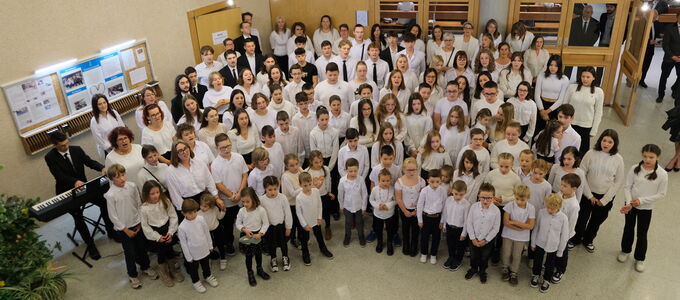
Why? There is no answer to the question of why there is suffering in the world or in one’s own life, but there is an attitude that can help. Because there is someone who wants to help for good and has a great plan in place. Here are some insights from a divine service.
“As I was reading Lamentations over the last couple of days, I thought I was reading the newspaper,” the Chief Apostle Jean-Luc Schneider said in Metz on 22 October 2023. The biblical book recalls the invasion of Judah by the king of Babylon, the destruction of Solomon’s temple, and the deportation of the people. And it describes many horrific scenes.
“I had the impression that I had opened the newspaper and was reading what is happening around the world today—in the Middle East, in Africa, in South America, and in Asia.” This raises a number of questions. If God loves humankind, why does He not intervene? Has He become indifferent to their fate? Does He want to punish human beings? Even the innocent?
Questions arising from distress
The questions sound similar when you think about the personal situation of some people. Why does God allow them to suffer so much? Why should some be punished for making bad choices, while others who have done far more dreadful things are doing just fine?
And then there is the development of the Church. In parts of the world, the number of congregations and members has declined sharply. Have previous or current Church leaders made mistakes? Can Christ accept that the future of His church is compromised by the wrongdoings of a few?
“Endless questions, no explanations, no answers!” the Chief Apostle says. “So what do we do now?”
God cannot help Himself
The author of Lamentations feels the same way. “He goes round in circles, he goes mad, he says: ‘The more I think, the more depressed I am.’ And at some point he says, I must concentrate on the nature of God now.”
Who is God? The Chief Apostle’s answers were as follows:
- God is love. He cannot do anything other than love. That is His nature.
- He is a God of mercy. He is sensitive to our suffering and is eager to help us.
- God is faithful, true, and trustworthy. When He says something, He does it.
- this is the help of God: to deliver all human beings definitively and radically from all evil final by leading them into perfect fellowship with Him.
- and God is almighty. No one can stop Him from coming to the aid of human beings and doing what He has promised.
Every morning anew
The author of Lamentations comes to the conclusion that the only thing you can do is believe in the word of God, call on Him for help, and patiently wait for His help.
The Bible text of the service attests to this: “This I recall to my mind, therefore I have hope. Through the Lord’s mercies we are not consumed, because His compassions fail not. They are new every morning; great is Your faithfulness” (Lamentations 3: 21–23).
And indeed, the Lord’s help was to come a few decades later. The exiles were able to return to Jerusalem and the temple was rebuilt.
Faith-based response
“How do we respond, dear brothers and sisters? Let us respond like the author of Lamentations,” the Chief Apostle urged.
- Yes, I believe. I believe that God is as the Holy Spirit tells me. I believe that God is as He revealed Himself through Jesus Christ.
- I surrender myself to Him. I trust Him, even though I do not understand what He is doing. I trust him without explanation.
- I do not know when His help will come, but I am absolutely convinced that His help will come. Hope means waiting with conviction while being active.
“God can help us. He can and will sort out a number of situations here and there, where people will say: God has worked a miracle,” Chief Apostle Schneider emphasised in conclusion. “But the greatest help will come to us who are waiting for the return of the Lord, the resurrection, the rapture of the bride. God’s help will come. It will come in a form that we cannot imagine, but it will come.”
























